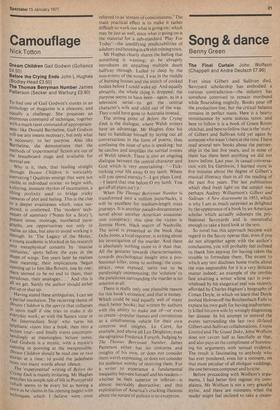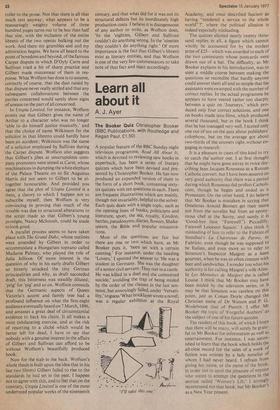Song & dance
Benny Green The Final Curtain John Wolfson (Chappell and Andre Deutsch £7.95) Ever since Gilbert and Sullivan died, Savoyard scholarship has embodied a curious contradiction—the industry has somehow contrived to remain moribund while flourishing mightily. Books pour off the production line, but the critical balance remains in perfect stasis. Here is a hearty reminiscence by some tedious tenor, and here to follow it is a book of Green Room chitchat, and here to follow that is the 'story' of Gilbert and Sullivan told yet again by someone who wasn't there at the time. I have read several new books about the partnership in the last five years, and in none of them has there been anything we did not know before. Last year, in casual conversation with Ira Gershwin, I learned more in five minutes about the degree of Gilbert's musical illiteracy than in all the reading of the past five years. The last publication which shed fresh light on the subject was perhaps Audrey Williamson's Gilbert and Sullivan: A New Assessment in 1953, which is why I am as much surprised as delighted by the appearance of a book by an American scholar which actually sidesteps the professional Savoyards and is resourceful enough to take a hard look at the text.
So novel has this approach become with regard to the Savoy operas that, even if you do not altogether agree with the author's conclusions, you will probably feel inclined to thank him anyway for having taken the trouble to formulate them. The extent to which any text discloses home truths about the man responsible for it is a very delicate matter indeed; an example of the terrible fate awaiting a writer whose tact is over-. whelmed by his exegetical zeal was recently afforded by Charles Higham's biography of Conan Doyle, in which we learn that Doyle pushed Holmesoff the Reichenbach Falls to expiate his own guilt for having inadvertently killed his own wife by wrongly diagnosing her disease. In his attempt to unravel the events surrounding the last two ill-fated Gilbert-and-Sullivan collaborations, Utopia Limited and The Grand Duke, John Wolfson does not cavort half as fancifully as that, and also pays us the compliment of buttressing his arguments with textual evidence. The result is fascinating to anybody who has ever pondered, even for a moment, on that most peculiar of all shotgun weddings, the one between composer and lyricist.
Before proceeding with Wolfson's arguments, I had better first register my complaints. Mr Wolfson is not a very graceful stylist, and there are moments when the reader might feel inclined to take a steam roller to the prose. Not that there is all that much text anyway; what appears to be a reassuringly weighty volume of three hundred pages turns out to be less than half that size, with the inclusion of the entire libretti of the two operas bulking out the work. And there my grumbles end and my admiration begins. We have all heard to the point of boredom and beyond, of the famous Carpet dispute in which D'Oyly Carte and Sullivan tried a bit of sharp practice and Gilbert made mincemeat of them in response. What Wolfson has done is to assume, correctly of course, that the dust raised by that dispute never really settled and that any subsequent collaborations between the parties concerned would surely show signs of unease on the part of all concerned.
In Utopia Limited, for instance, Wolfson points out that Gilbert gives the name of Arthur to a character who was no longer 'able to do himself justice musically,' and that the choice of name Wilkinson for the solicitor in that libretto could hardly have been an accident ; Wilkinson was the name of a solicitor employed by Sullivan during the Carpet dispute. Wolfson also suggests that Gilbert's jibes at unscrupulous company promoters were aimed at Carte, whose machinations in dumping the white elephant of the Palace Theatre on to Sir Augustus Harris did not seem to Gilbert to be altogether honourable. And provided you agree that the plot of Utopia Limited is a mess, a theory to which I happen not to subscribe myself, then Wolfson is very convincing in proving that much of the trouble was due to structural alterations to the script Made so that Gilbert's young protegee, Nancy McIntosh, could be made to look good.
A parallel process seems to have taken place with The Grand Duke, whose outlines were amended by Gilbert in order to accommodate a Hungarian soprano called Madame Palmay, who played the role of Julia Jellicoe. Of more interest is the question of why in his early drafts Gilbert • so bitterly attacked the tiny German principalities and why, as draft succeeded draft, this bitterness was steadily diluted; 'prig' for 'pig' and so on. Wolfson contends that the Germanic aspects of Queen Victoria's accent and family tree had a profound influence on what the first-night audience eventually hearcton 7 March, 1896, and amasses a great deal of circumstantial evidence to back his claim. It all makes a most exhilarating exercise, and at the risk of resorting to a cliché which would be better left for dead, I have to say that nobody with a genuine interest in the affairs
• of Gilbert and Sullivan can afford to be without Wolfson's beautifully produced book.
Now for the stab in the back. Wolfson's whole thesis is built upon the idea that in his last two libretti Gilbert failed to rise to the standards he had set in the past. I happen not to agree with this, and to feel that on the contrary, Utopia Limited is one of the most underrated popular works of the nineteenth century, and that what did for it was not its structural defects but its inordinately high production costs. I believe it is disingenuous of any author to write, as Wolfson does, 'In the 'eighties, Gilbert and Sullivan couldn't do anything wrong. In the 'nineties they couldn't do anything right.' Of more importance is the fact that Gilbert's libretti exist as literary entities, and that Wolfson is one of the very few commentators to take note of that fact and react accordingly.



































 Previous page
Previous page